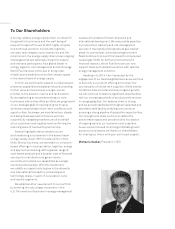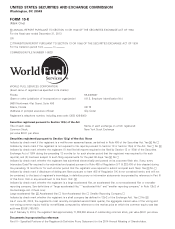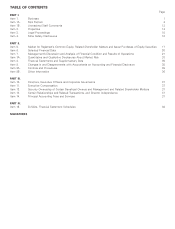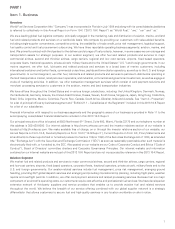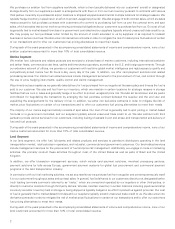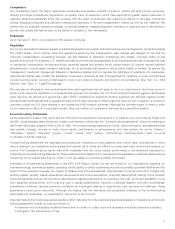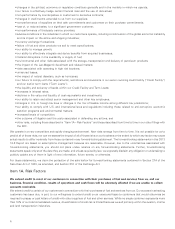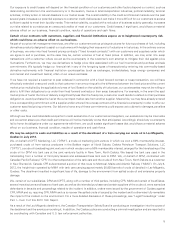World Fuel Services 2013 Annual Report Download - page 8
Download and view the complete annual report
Please find page 8 of the 2013 World Fuel Services annual report below. You can navigate through the pages in the report by either clicking on the pages listed below, or by using the keyword search tool below to find specific information within the annual report.We purchase our aviation fuel from suppliers worldwide, which is then typically delivered into our customers’ aircraft or designated
storage directly from our suppliers pursuant to arrangements with them or from our fuel inventory pursuant to contracts with various
third parties. Inventory is purchased at airport locations or shipped via pipelines and held at multiple locations for strategic reasons. We
typically hedge inventory in pipelines in an effort to protect us against price risk. We also engage in both contract sales, which are sales
made pursuant to fuel purchase contracts with customers who commit to purchasing fuel from us over the contract term, and spot
sales, which are sales that do not involve continuing contractual obligations by our customers to purchase fuel from us. Our cost of fuel
is generally tied to market-based formulas or is government controlled and our suppliers typically extend unsecured trade credit to us.
We may prepay our fuel purchases when limited by the amount of credit extended to us by suppliers or as required to transact
business in certain countries. We also enter into derivative contracts in order to mitigate the risk of market price fluctuations of certain
of our transactions and to offer our customers fuel pricing alternatives to meet their needs.
During each of the years presented in the accompanying consolidated statements of income and comprehensive income, none of our
aviation customers accounted for more than 10% of total consolidated revenue.
Marine Segment
We market fuel, lubricants and related products and services to a broad base of marine customers, including international container
and tanker fleets, commercial cruise lines, yachts and time-charter operators, as well as to the U.S. and foreign governments. Through
our extensive network of offices, we provide our customers with real-time global market intelligence and rapid access to quality and
competitively priced marine fuel 24 hours a day, every day of the year. In addition, we offer card payment solutions and related
processing services. Our marine fuel related services include management services for the procurement of fuel, cost control through
the use of price hedging instruments, quality control and claims management.
We primarily act as a reseller as we generally take delivery for fuel purchased from our supplier at the same place and time as the fuel is
sold to our customer. We also sell fuel from our inventory, which we maintain in certain locations for strategic reasons in storage
facilities that we own or lease and generally hedge in an effort to protect us against price risk. We also act as a broker and are paid a
commission for negotiating the transaction by arranging the fuel purchase contract between the supplier and the end user and
expediting the arrangements for the delivery of fuel. In addition, we enter into derivative contracts in order to mitigate the risk of
market price fluctuations on certain of our transactions and to offer our customers fuel pricing alternatives to meet their needs.
The majority of our marine segment activity consists of spot sales. Our cost of fuel is generally tied to spot pricing or market-based
formulas or is government controlled, and our suppliers typically extend unsecured trade credit to us. We also contract with third
parties to provide various services for our customers, including fueling of vessels in port and at sea, and transportation and delivery of
fuel and fuel products.
During each of the years presented in the accompanying consolidated statements of income and comprehensive income, none of our
marine customers accounted for more than 10% of total consolidated revenue.
Land Segment
In our land segment, we offer fuel, lubricants and related products and services to petroleum distributors operating in the land
transportation market, retail petroleum operators, and industrial, commercial and government customers. Our land-related services
include management services for the procurement of fuel and price risk management. Additionally, we engage in crude oil marketing
activities. We primarily conduct these activities throughout most of the United States as well as parts of Brazil and the United
Kingdom.
In addition, we offer transaction management services, which include card payment solutions, merchant processing services,
payment solutions for tolls across Europe, government payment systems for global fuel procurement and commercial payment
programs in the land transportation industry.
In connection with our fuel marketing activities, we act as a reseller as we purchase fuel from a supplier and contemporaneously resell
it to our customers through spot sales and contract sales. In general, fuel is delivered to our customers directly or at designated tanker
truck loading terminals commonly referred to as ‘‘racks,’’ which are owned and operated by our suppliers or other third-parties, or
directly to customer locations through third party carriers. We also maintain inventory in certain locations including pipelines and ship
inventory via railcar. Inventory held in storage or being shipped is typically hedged in an effort to protect us against price risk. Our cost
of fuel is generally tied to market-based formulas and our suppliers typically extend unsecured trade credit to us. We also enter into
derivative contracts in order to mitigate the risk of market price fluctuations for certain of our transactions and to offer our customers
fuel pricing alternatives to meet their needs.
During each of the years presented in the accompanying consolidated statements of income and comprehensive income, none of our
land customers accounted for more than 10% of total consolidated revenue.
2


